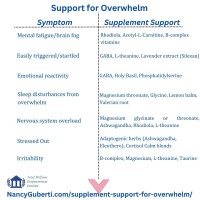
Supplements for Overwhelm – A Natural Approach to Restoring Balance
In today’s fast-paced world, feeling overwhelmed has become a common experience for many people. Whether it’s due to juggling work, family obligations, sensory overload, or emotional challenges, overwhelm can manifest physically and emotionally—leaving people feeling stuck, anxious, and unable to cope. While therapy, lifestyle changes, and nervous system regulation are foundational to healing, targeted supplements can help calm the chaos and support your body’s natural resilience.
What Happens in the Body When You’re Overwhelmed?
Overwhelm is typically a sign that your brain and nervous system are struggling to process incoming stimuli efficiently. It often involves heightened sympathetic nervous system activity (fight-or-flight), reduced parasympathetic tone (rest-digest), neurotransmitter imbalances, and adrenal strain. The result: you feel mentally foggy, emotionally flooded, irritable, and physically depleted.
Common symptoms include:
Racing thoughts
Inability to concentrate
Mood swings or irritability
Tension and muscle tightness
Digestive issues
Sleep disturbances
Emotional reactivity
The Role of Nutrition and Supplements
Your body requires certain nutrients to create neurotransmitters (like serotonin, dopamine, and GABA), support adrenal function, and regulate the stress response. When overwhelmed, these systems burn through nutrients faster, creating imbalances that intensify symptoms.
Supplements can play a critical role in helping people stabilize their nervous system and feel more grounded. Below is a guide to specific symptoms of overwhelm and corresponding supplements that help support regulation and clarity.
Supplement Spotlight
Let’s take a closer look at some of the standout supplements for overwhelm:
L-Theanine – Found naturally in green tea, L-theanine promotes alpha brain wave activity, associated with relaxed alertness. It helps reduce overstimulation without causing drowsiness.
GABA (Gamma-Aminobutyric Acid) – This inhibitory neurotransmitter plays a central role in calming the nervous system. Supplemental GABA can help quiet mental noise and reduce emotional reactivity.
Magnesium Glycinate or Threonate – Magnesium is often called the “relaxation mineral” for a reason. It helps regulate cortisol, reduces muscular tension, and supports restful sleep. Glycinate is calming, while threonate crosses the blood-brain barrier and improves cognition.
Rhodiola – An adaptogen that helps the body adapt to stress and improve mental clarity. It’s especially helpful for overwhelm paired with fatigue or burnout.
Ashwagandha – This ancient Ayurvedic adaptogen helps buffer cortisol, soothe anxiety, and restore adrenal balance. It’s particularly useful for long-term overwhelm and sensory sensitivity.
Tips for Supplementing Safely and Effectively
Always start low and increase gradually to assess tolerance.
Use in combination with lifestyle interventions like breathwork, nature walks, and therapy.
Track symptom changes to identify which supplements offer the most benefit.
Pair calming supplements with nutrient-dense foods that stabilize blood sugar and enhance resilience.
When to Consider Testing
If overwhelm persists despite nutritional and lifestyle interventions, consider functional lab testing. Organic acid tests (OAT), salivary cortisol, or neurotransmitter panels can reveal underlying biochemical imbalances that guide more targeted support.
The Bigger Picture: Nervous System Literacy
Overwhelm isn’t a sign of weakness—it’s a signal from your body that your nervous system needs support. When your brain and body are in harmony, your capacity to handle life’s challenges expands.
Using supplements wisely can help reduce the intensity of overwhelm, making space for therapy, self-regulation, and deeper healing.
The information provided on this website is for educational and informational purposes only. It is not intended to serve as medical advice, diagnosis, or treatment. The supplements discussed may not be suitable for everyone and could interact with medications or pre-existing health conditions.
Always consult a qualified healthcare professional, such as a medical doctor or registered dietitian, before starting any new supplement protocol or making changes to your diet or exercise regimen.
Individual results may vary, and the use of supplements carries potential risks. The author and publisher are not responsible for any adverse effects or consequences resulting from the use of the information provided in this article.
Tags: anxiety, depression, Functional medicine lab, functional medicine lab testing, mental health, Nancy Guberti, overwhelm, stress, supplements for overwhelm, Total Wellness Empowerment Institute
Leave A Reply (No comments So Far)
No comments yet